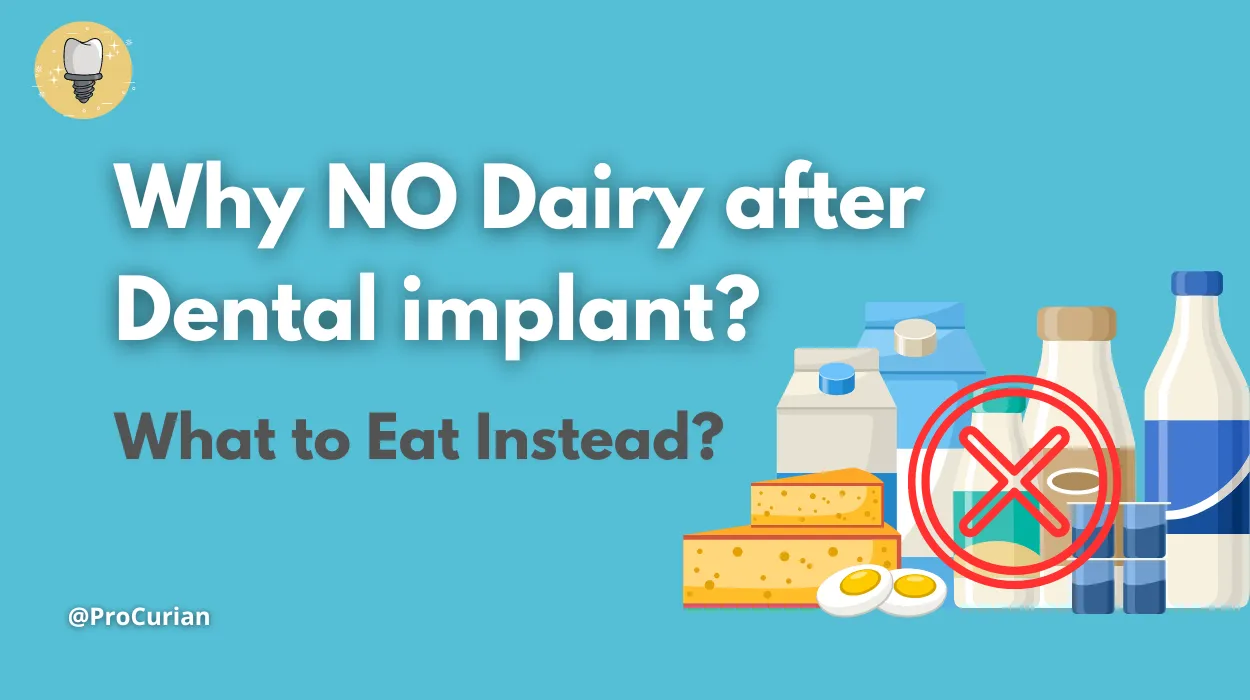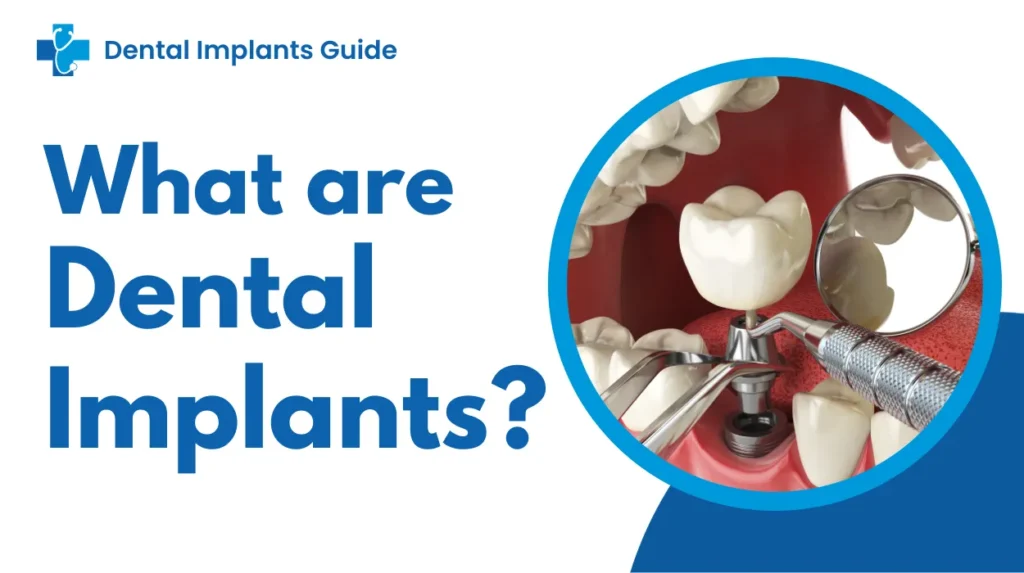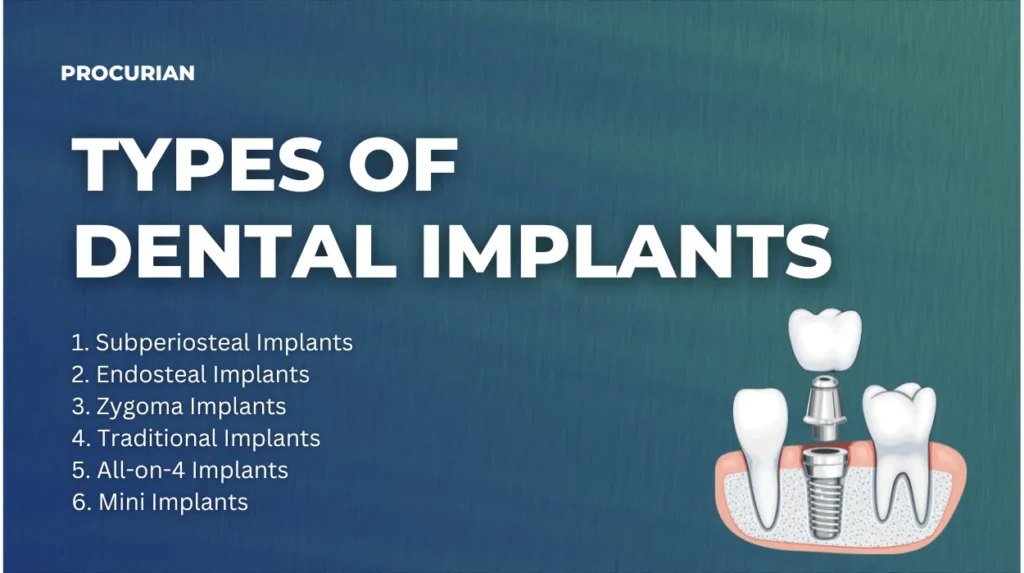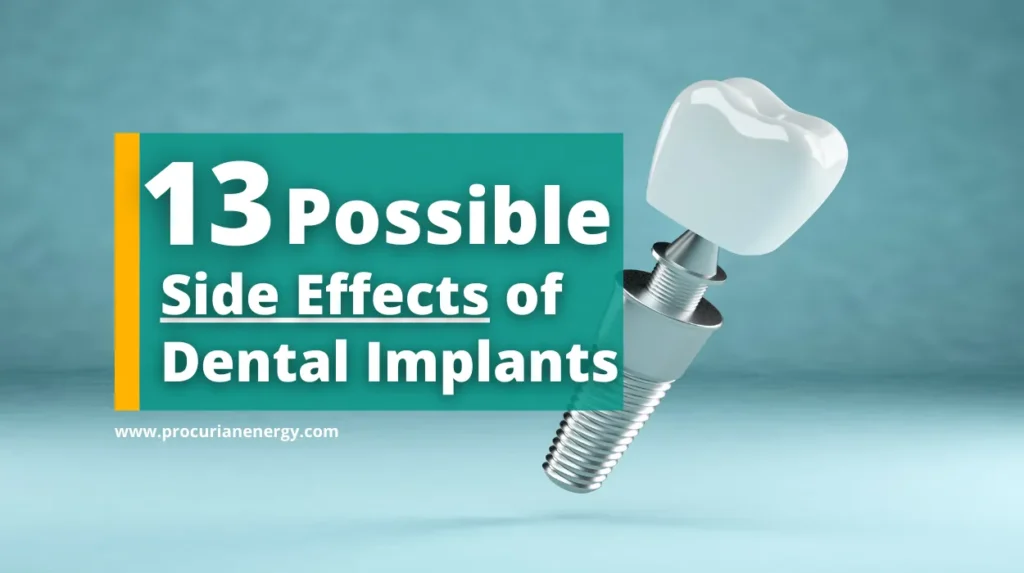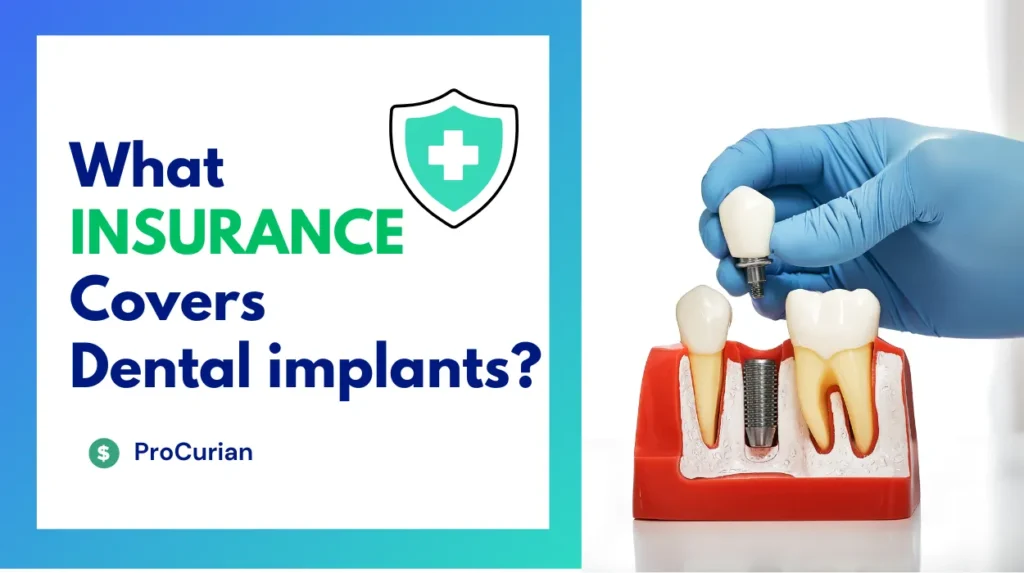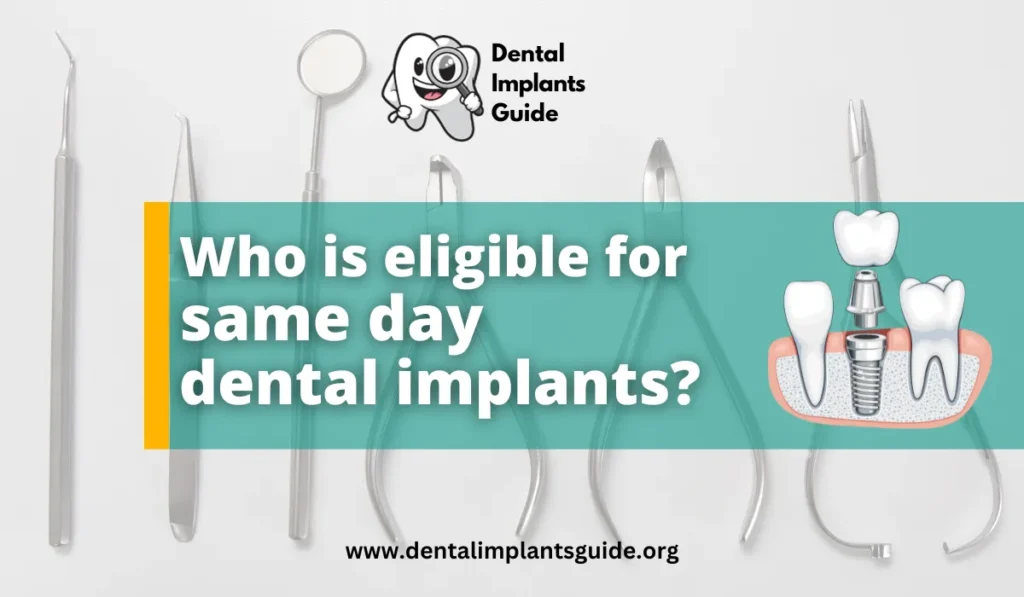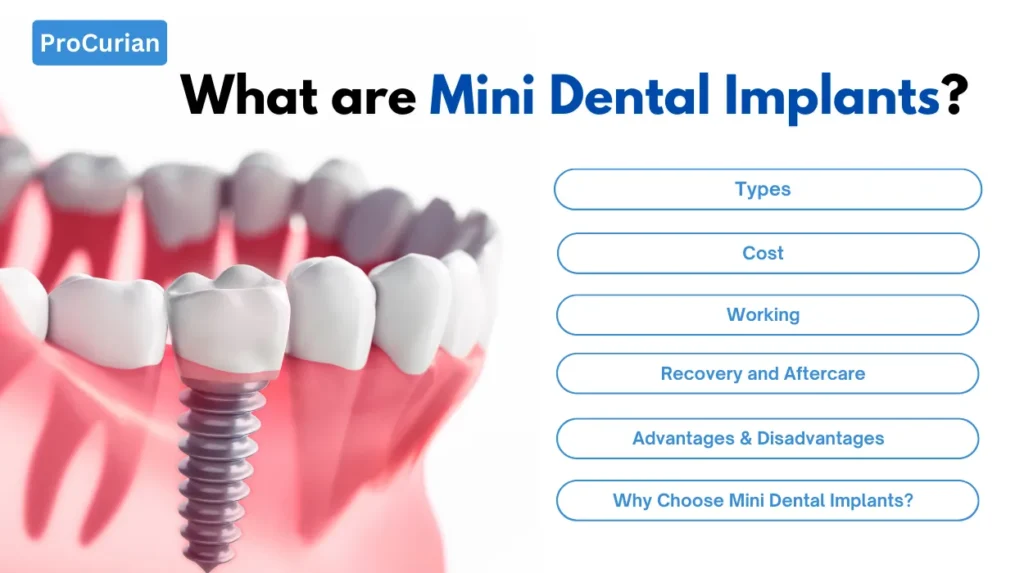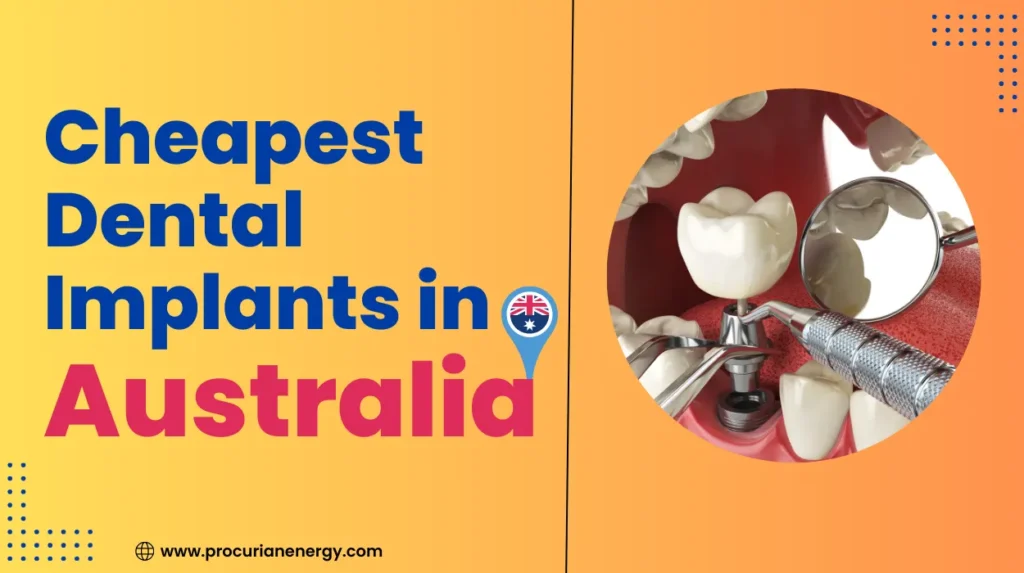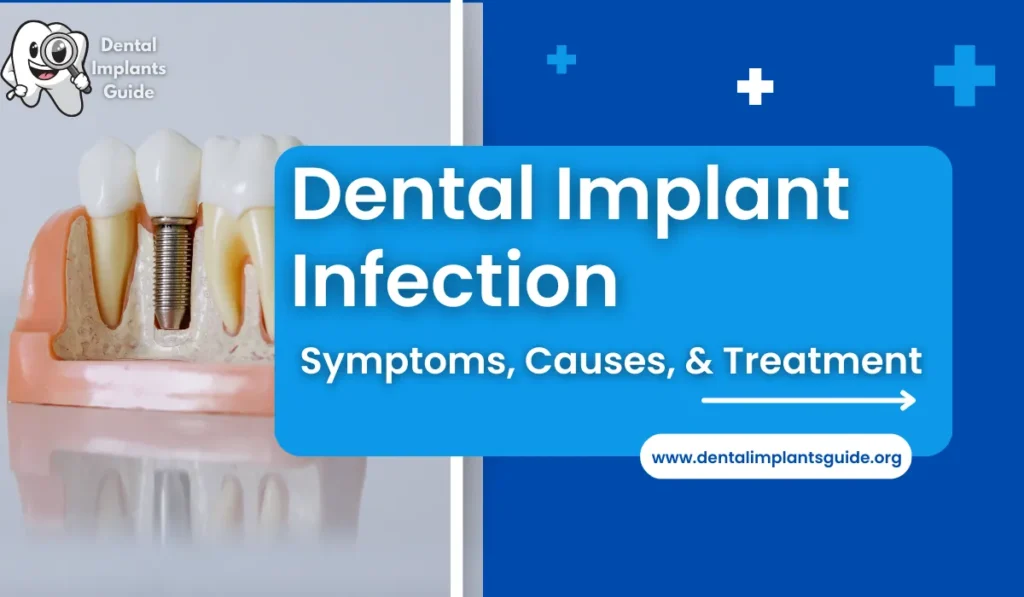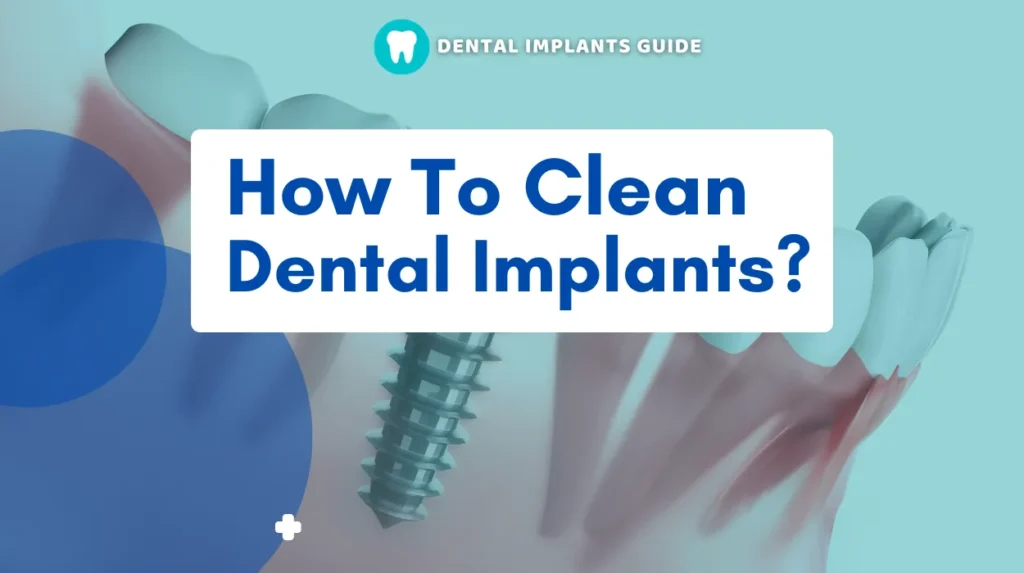Hey there, dear readers!
If you’ve recently had a dental implant or are planning to get one, you might have heard that you should avoid dairy products for a little while.

But why is that? Well, I’m here to break it down for you in simple terms.
What are Dental Implants?
Dental implants are like super-strong, artificial tooth roots that are put into your jawbone. They’re used to support replacement teeth, and they can be a game-changer if you’ve lost some of your pearly whites.
Dairy and Dental Implants – What’s the Connection?
Dairy products like milk, yogurt, and cheese are delicious and filled with vitamins and minerals like calcium and vitamin D. These nutrients are fantastic for keeping your bones and teeth strong and healthy.
You may be asking yourself, “Why should I skip them after a dental implant?“
Also See: How to get FREE Dental Implants?
Why NO Dairy after Dental implant?

1. Healing Time
When you get a dental implant, it’s like planting a little titanium screw in your jawbone. This screw needs some time to bond with your bone, a process called “osseointegration“. During this healing time, you want to create the best conditions for success.
Dairy products can be a bit thick and sticky, especially cheese and yogurt. Chewing these can put extra pressure on your implant site. We want to give your new implant a peaceful environment to heal without any disturbances.
2. Infection Risk
Another reason to avoid dairy products for a little while after your dental implant is that they can hide bacteria. Dairy can get stuck in the nooks and crannies of your mouth, and bacteria love to hang out there.
Infection around your implant is something we want to avoid at all costs because it can slow down the healing process and even jeopardize the implant’s success.
3. Acidity
Some dairy products, like yogurt, can be acidic. This acidity might not play well with the healing tissues in your mouth.
What to Eat Instead after Dental implant?
Okay, so you’re skipping dairy for a bit, but what can you eat after dental implants surgery? Don’t worry; there are plenty of delicious and nutritious options:
1. Soft Foods
You still need protein to help your body heal. Try eggs, soft fish, tofu, or even some well-cooked beans. Opt for foods like:
- Mashed Potatoes – Soft and easy to eat.
- Yogurt – A good source of protein and probiotics.
- Oatmeal – Cooked until it’s very soft and easy to swallow.
- Smoothies – Blended with yogurt, fruits, and protein powder for extra nutrition.
- Applesauce – A gentle option for getting some fruit into your diet.
- Pudding – A creamy, easy-to-eat dessert.
Here are 50 soft foods to eat after dental implant surgery:
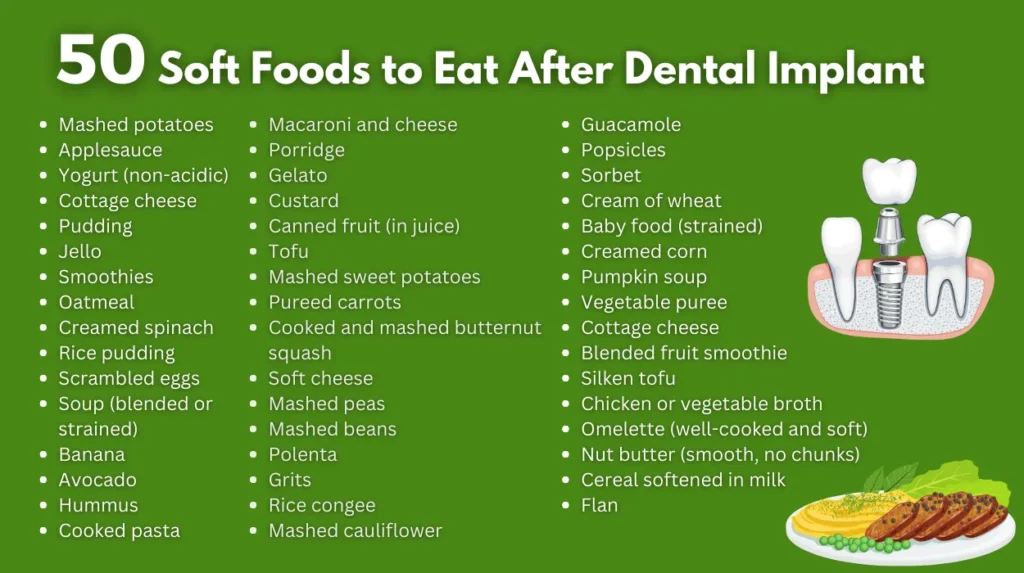
| Mashed potatoes | Applesauce | Yogurt (non-acidic) | Cottage cheese |
| Pudding | Jello | Smoothies | Oatmeal |
| Creamed spinach | Rice pudding | Scrambled eggs | Soup (blended or strained) |
| Banana | Avocado | Hummus | Cooked pasta |
| Macaroni and cheese | Porridge | Gelato | Custard |
| Canned fruit (in juice) | Tofu | Mashed sweet potatoes | Pureed carrots |
| Cooked and mashed butternut squash | Soft cheese | Mashed peas | Mashed beans |
| Polenta | Grits | Rice congee | Mashed cauliflower |
| Guacamole | Popsicles | Sorbet | Cream of wheat |
| Baby food (strained) | Creamed corn | Pumpkin soup | Vegetable puree |
| Cottage cheese | Blended fruit smoothie | Silken tofu | Chicken or vegetable broth |
| Omelette (well-cooked and soft) | Nut butter (smooth, no chunks) | Cereal softened in milk | Flan |
2. Soups
Broth-based soups that are not too hot can be a good choice. Avoid chunky soups with solid pieces.
3. Protein
Maintain your protein intake for proper healing. Consider foods like:
- Scrambled Eggs – Soft and protein-rich.
- Cottage Cheese – A good source of protein and calcium.
- Blended or Pureed Meats – If you’re craving meat, blend it into a smooth consistency or choose ground meats.
4. Fruits and Vegetables
Steam or boil vegetables until they are soft. Avoid raw or crunchy vegetables until you receive clearance from your dentist.
What are the Foods to avoid after dental implants?
1. Avoid Crunchy and Hard Foods
During the initial healing phase, avoid foods that are hard, crunchy, or require a lot of chewing, such as:
- Nuts and Seeds: These can be abrasive and may get stuck in the surgical area.
- Popcorn: Small kernel pieces can easily get lodged in the surgical site.
- Chips: Avoid crunchy snacks like potato chips.
- Hard Candy: Anything hard or sticky should be avoided.
2. Alcohol and Smoking
Avoid alcohol and smoking during the healing process, as they can interfere with the healing of the surgical site.
3. Hot and Spicy Foods
These can cause discomfort and irritation in the surgical area. It’s best to avoid hot soups, spicy sauces, and foods with a high spice level until you’ve fully healed.
4. Carbonated and Acidic Beverages
Carbonated drinks(Soda & acidic juices) can create gas and discomfort, which can be particularly problematic during the initial healing phase. Stick to still, non-carbonated beverages like water and herbal teas.
5. Tough Meats
Avoid tough cuts of meat that require extensive chewing. Opt for softer, more tender cuts or ground meats during the initial healing period.
How Long Should You Avoid Dairy?
The time you should steer clear of dairy can vary from person to person. Usually, it’s recommended to avoid it for at least the first week after your surgery.
Your dentist or oral surgeon will give you specific guidelines based on your unique situation.
How long after dental implants can i eat normally?
Usually, it takes about 2 to 6 months for the implants to fully heal and bond with your jawbone. During this time, it’s best to eat soft and gentle foods that won’t put too much pressure on your new implants.
But don’t worry, it’s not forever! Once your dentist gives you the green light and says your implants are good and strong, you can go back to eating normally, just like you used to.
How to heal faster after dental implants?
Healing faster after dental implants is important, and it’s easier than you might think! Here are some simple tips to help you recover quickly:
- Rest – First things first, give your body the rest it needs. Take it easy for a few days after the surgery. Relax and avoid strenuous activities.
- Follow Doctor’s Orders – Listen to your dentist or oral surgeon. They’ll give you instructions on how to care for your implant site. Follow these guidelines carefully.
- Pain Medication – If your dentist prescribes pain medication, take it as directed. This can help you feel more comfortable during the healing process.
- Cold Compress – If your cheek swells, you can apply a cold compress to reduce swelling. Just make sure to wrap it in a cloth or towel before applying it to your face.
- Stay Hydrated – Drink plenty of water. Staying hydrated helps your body heal faster.
- Regular Check-ups – Keep your follow-up appointments with your dentist. They’ll monitor your progress and make sure everything is healing well.
FAQs
Why can’t I have dairy after getting a dental implant?
After getting a dental implant, you need to be careful with dairy because it can slow down your healing process. Dairy products like milk, yogurt, and cheese contain calcium, which is good for your bones but not right after implant surgery.
How does dairy affect dental implant healing?
Dairy has lots of calcium, which is awesome for your bones in the long run. But right after a dental implant, you don’t want your body to work too hard to process it. It can make the area around your new implant swollen and painful.
Can I have dairy at all after a dental implant?
You can have dairy, but it’s better to wait for a little while, about a week or so after the surgery. Once your implant has settled in and started healing, you can slowly introduce dairy back into your diet.
What can I eat instead of dairy after a dental implant?
You can eat soft and easy-to-chew foods like mashed potatoes, oatmeal, scrambled eggs, and yogurt alternatives made from almond or coconut milk. These won’t irritate your implant site.
When is it safe to go back to regular dairy after a dental implant?
It’s usually safe to go back to regular dairy products about a week after your dental implant surgery. But always listen to your dentist’s advice because everyone’s healing process can be a bit different.
Is it okay to have ice cream after a dental implant?
Ice cream can be a bit cold and may cause discomfort right after surgery. It’s better to wait until you’ve healed a bit before enjoying ice cream or any very cold foods.
Can I have dairy-free alternatives like almond milk or soy milk after a dental implant?
Yes, you can have dairy-free alternatives like almond milk or soy milk. These are usually easier on your implant site and can be a good choice during the healing process.
What if I accidentally have dairy after a dental implant?
If you accidentally have dairy and you feel some discomfort or swelling around your implant site, don’t worry too much. Just make sure to avoid dairy for a while after that to give your implant the best chance to heal.
Is it the same for all dental implants?
Dental implants can vary, and some people may heal faster or slower. Always follow the specific instructions given by your dentist because they know your situation best.
Final Words
So, there you have it! The reason to avoid dairy after a dental implant is to help your implant heal smoothly and reduce the risk of infection.
During this time, opt for soft, easy-to-eat foods that won’t disrupt your implant’s journey to becoming a part of your smile. Before you know it, you’ll be back to enjoying all your favorite dairy treats with a strong and healthy implant to show off!
